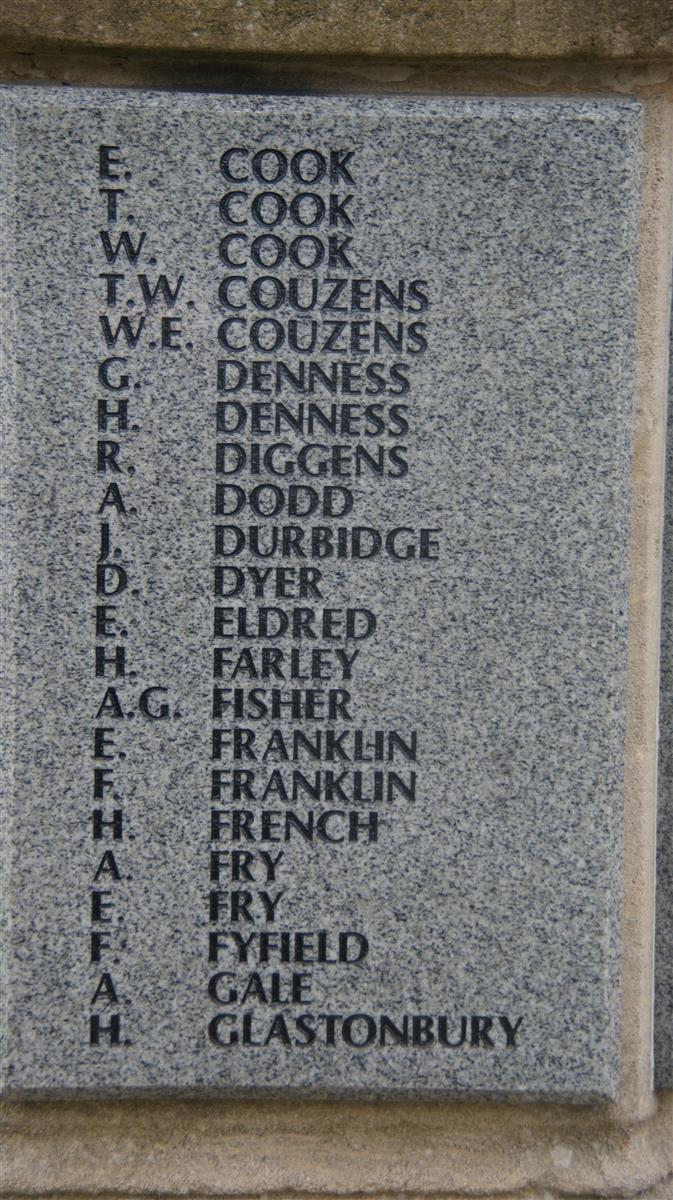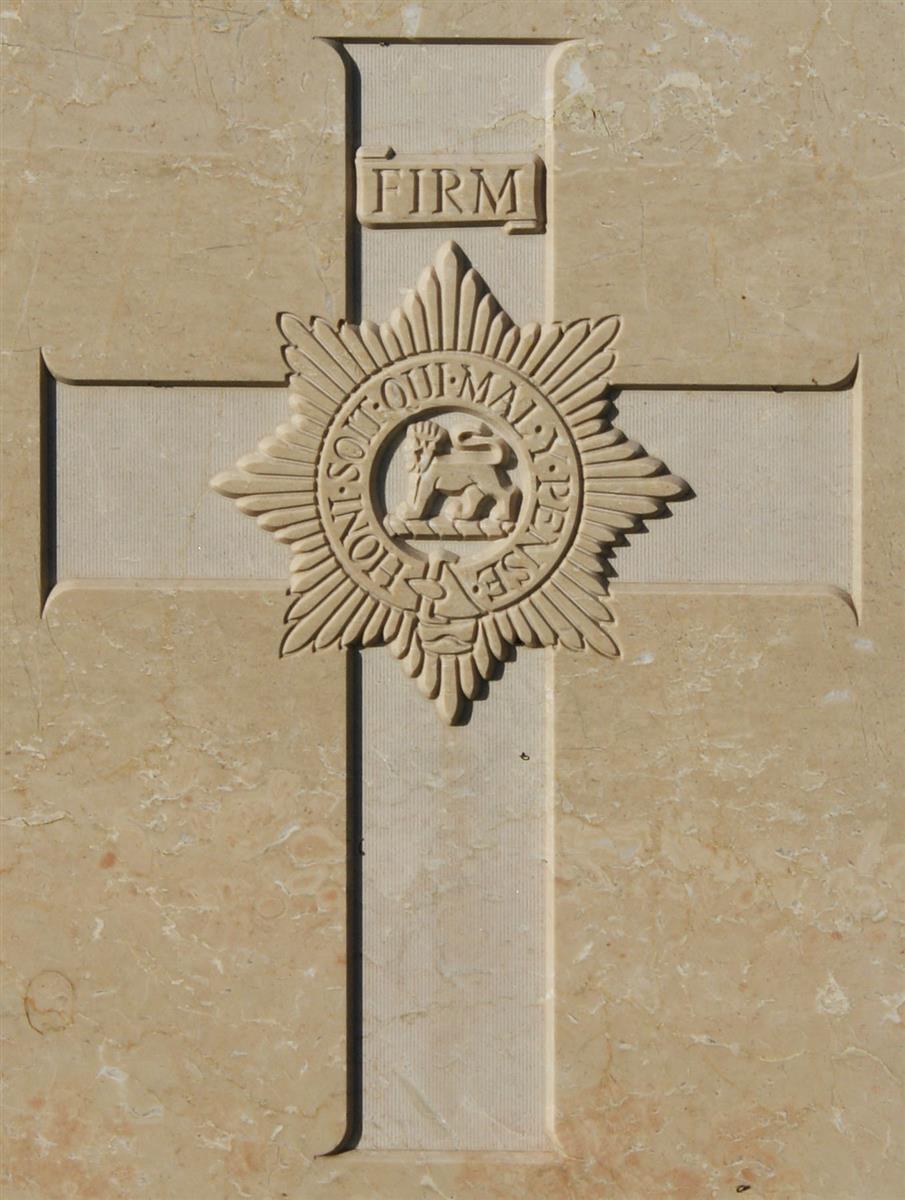Alfred Arthur Fry
Private 5141 Alfred Arthur Fry, 1/7th Battalion, Worcestershire Regiment.

Alfred's name on Thatcham War Memorial - above his brother Ernest. |
Alfred was born in Crookham, Berkshire on 9 April 1892 the son of James Charles Fry and his wife Ellen Rose née Dowling. James was a baker serving the scattered community to the south of Crookham and Greenham Commons. Crookham is a hamlet of the much larger village of Thatcham (now a town of 30,000+ inhabitants), but the Fry’s lived in Head’s Hill, an area far from the main settlement and some distance from the cluster of housing normally thought of as Crookham. In reality he probably got as much trade from the villages of Newtown and Headley; close by but over the border in Hampshire.
Alfred was the youngest of four children, all brothers; the others were Ernest James (born 1885), Albert John (1886), and Jesse Charles (1889).
The bakery evidently did a decent trade because both Ernest and Albert joined their father in the business rather than seek employment elsewhere. By 1911 Arthur had left home to work, as a baker, for Henry Pearce in Headley – where he was probably serving an apprenticeship as he too had joined the family business by 1916. The remaining brother, Jesse, was the only one to rebel against embroilment in the family trade; he became a ‘cycle agent’, which covers a wide range of activities, but Jesse was more the local cycle repair man that the business entrepreneur selling a wide range of the latest bicycles.
After war was declared in August 1914 many young men eagerly volunteered, but not Alfred. By this time his father was 64 and, and the three brothers, Ernest, Albert and Arthur, were heavily involved in the running of the family business; each had a not more to lose than an employee would. However, the Government introduced conscription in January 1916 and Alfred was duly called up for service.
Ernest, John and Alfred were all called up – and foolishly ignored their papers, believing they were automatically exempt because they were working in a reserved occupation. When a second set of papers arrived they should have realised things were not that simple – but they ignored them again. The next call was from the police, who came to arrest them for not appearing to be attested (the first step in enlistment – form signing and a medical).
They appeared before a magistrate in Newbury, who adjourned the case so they could appeal against their conscription at the local Tribunal. For a newspaper report of the case see here.
The brothers’ case appeared before the Newbury Rural Tribunal on 2 May 1916:
Reading Mercury, 6 May 1916 – Newbury Rural Tribunal
Chief interest in the proceedings centred around the appeal sent in on behalf of three brother bakers – Ernest James Fry (31). Albert James [sic] Fry (28), and Alfred Arthur Fry (23) – the sons of Mr J C Fry, baker, of Crookham, near Newbury. It will be remembered that the three men were recently arrested by the police for failing to report themselves to the military authorities pursuant to two notices which were sent them, and which they admitted receiving. When before the court, Mr Lucas, solicitor, appeared on their behalf, and state that being under the impression they were engaged in a certified occupation as bakers, they had not attested or made any appeal. On his application the matter was adjourned for a fortnight to enable an appeal to be made to the Tribunal, so that the cases might be heard on their merits. This course might be heard on their merits. This course was assented to by the magistrate who heard the case, a belated protest by Lieutenant Bidmead, who represented the military on that occasion, not being entertained. Mr Lucas appeared before the Tribunal on Tuesday in support of the appeal, which was made by the father. Mr Lucas stated that Mr Fry did a baking business of twelve sacks per week, and there was no other baker within 3½ miles The sons’ time was entirely given up to baking and the delivery for which two horses and carts and a bicycle were daily employed.
Major Bertram, for the military, here intimated that he objected to the appeals being heard at all on the ground of time.
Mr Lucas having read the portion of the Military Service Act bearing on the point, while agree that an appeal should have been made, urged that the impression held by Mr Fry that baking was a reserved employment was sufficient reason for asking that the appeals should now be heard on their merits.
Mr Fry was called and said he had four sons, one of whom was in the Army. In reference to the other three, he was under the impression that he need not appeal, and therefore had not done so.
Examined by Major Bartram, he said he had always thought this, but could not say why, when he did make the appeal he did not do so on these grounds, but on others. He knew his sons had received papers calling them to the Colours, but neither he nor they had taken any steps to find out if these notices were in order, because, being bakers, they did not think it necessary. He read the newspapers when he had time, and noticed the reports of Tribunals.
Major Bertram applied that the cases should not be heard on their merits. If these men had taken the trouble to consult the authorities such proceedings might not have been taken. But they had ignored bith the first and second notice sent them to join the Colours. One would have thought they would have done something to find out about the matter, instead of which they let it all slide, and left it until they were arrested by the police.
Mr Lucas, replying, said it was not likely that Mr Fry would read the proceedings of Tribunals or that his sons would learn the intricacies of these matters. He contended that a reasonable ground had been established for allowing the appeals to be heard on their merits, and reminded the Tribunal that there was a need for bread for women and children as well as of men for the Army.
In reply to the chairman, Mr Fry said he was informed by a magistrate that baking was a certified occupation.
The clerk pointed out that in neither of the appeals was this specific ground taken, to which Mr Lucas replied that it was set out fully in the applications.
The Tribunal deliberated in private, and on their return the chairman said they had carefully considered the matter and declined to hear the appeals.
Mr Lucas: To-morrow there will be a considerable district without bread.
There is no reason to believe that all three would have been granted exemption had they appealed at the appropriate time – it is hard to believe that a tribunal would consider that a small rural bakery had genuine need for three bakers. Perhaps one, probably Ernest as the eldest, would have been reprieved. Certainly the desperate state of the bakery business seems to have been exaggerated; their father was still running it a decade later.

The regimental badge of the Worcestershire Regiment, on a recently cut CWGC headstone. |
The 3/7th was a training battalion, where Alfred would be given the basic training needed to turn a civilian into a soldier. Once they reached a certain level of competence trainees were posted to one of the regiment’s battalions n the field. In Alfred’s case this was the 1/7th (Territorial) Battalion; he landed in France on 14 August 1916 (after a remarkably short period of training) en route to the battalion which he joined on 16 September. Most of the intervening month was probably spent at an Infantry Base Depot, where he would have received more training.
Two months later, on 15 November, Alfred was wounded with what is given in his paperwork as GSW (shrap) – gunshot wound (shrapnel). Shrapnel shells contained numerous ‘bullets’ – balls of lead or steel – that were sprayed around when the shell burst. So, although not strictly a gunshot wound the damage caused was very similar to that of a bullet fired from a rifle. Alfred received wounds to his right arm and right leg. He was treated at 45 CCS (casualty clearing station) and 3 Stat H (stationary hospital – in Rouen) and then, on 22 November, evacuated to England on the SS Aberdonian. The wound to his leg (thigh) proved to be fatal, it became infected and Albert died in Bradford War Hospital of septicaemia on 27 November 1916.
Information about his funeral was printed in the war news column:
Newbury Weekly News, 7 December 1916 – Local War Notes
The late Pte Alfred Fry, the youngest son of Mr and Mrs Fry, of Crookham, who died of wounds at War Hospital, Bradford, Yorkshire, was buried at Thatcham Cemetery with military honours. The mourners were father, mother, and brother, Miss Newman, Mrs Simpson, Miss Heal, Miss Head, Miss Gostling. Wreaths were sent by Father, Mother and Brothers, in ever loving memory; Dorothy; Fanny and Bill; Anna Alice and Mary; Mr and Mrs Gostling and Nellie; Mr and Mrs Hazel and family; Mr and Mrs Bew and family; Miss Clarke; Mr J Brown and Miss Collins, of Headley; Friends of Headley; Friends of Bishops Green; Mr and Mrs Miller. Flowers: Mrs Leng, Mrs Parkyns.
And a month after his death a notice appeared in the Family Announcements column:
Newbury Weekly News, 28 December 1916 – Died of Wounds
In loving memory of Pte A Fry, No 5141, A Company, Worcestershire Regt, who died of wounds November 27th, 1916, aged 23 years.
The call was short, the shock severe,
To part with one we loved so dead;
Our hope’s in Heaven that we may meet,
And then our joy will be complete.
Alfred was buried on 1 December 1916 in grave 1002 at Thatcham Cemetery. He is remembered on the Thatcham War Memorial and on the memorial board in St Mary’s Church, Thatcham.
The anniversary of his death was publically remembered by his family:
Newbury Weekly News, 6 December 1917 – In Memoriam
In ever loving memory of Pte Alfred Fry, late of the 1/7th Worcestershire Regt, who died of wounds received in action at Delville Wood, France.
It is just twelve months ago
That he was called above;
From one that he has always loved,
In future we shall meet above.
From his loving Father, Mother and Brothers
Family
Please see Ernest James Fry for his story and information on the remaining brothers, Jesse and Albert.
Locally William is remembered on tablet 12 of the Newbury Town War Memorial, the memorial board and roll of honour in St Nicolas’ Church, Newbury.
